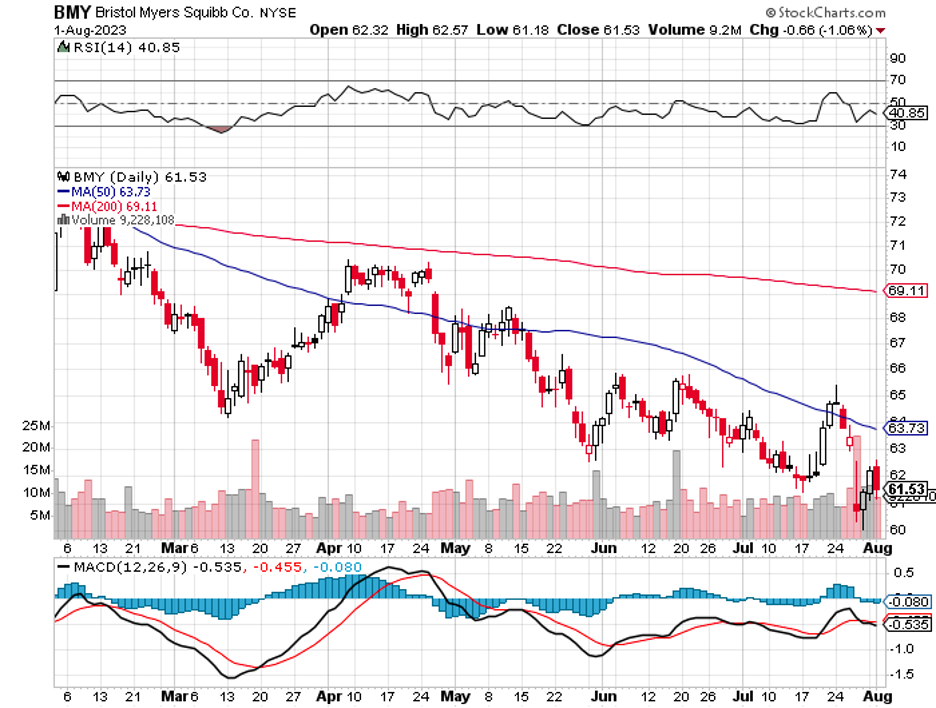A Discounted Phoenix Set to Rise
The rollercoaster ride that is the equity market never fails to excite, surprise, and occasionally bemuse us. There's an erratic heartbeat in how it functions - illogical at times, downright whimsical at others. The upshot? Sometimes, great companies find themselves in the bargain bin of Wall Street – perfect for investors who love a good discount.
This is where Bristol Myers Squibb (BMY) comes in.
In the rear-view mirror of the past year, Bristol Myers Squibb hasn't exactly been the star of the stock market show. Its financial pulse has been somewhat weak, with lethargic revenue growth and, at times, flatlining completely. A big part of this has been the loss of patent exclusivity on a once superstar medication last year, causing its top line to struggle.
Flash forward to BMY dropping its Q2 2023 financial report, and the question is whether the company met the Street's expectations. Well, not exactly.
Let's dive into the numbers. The Q2 2023 revenue was a hefty $11.23 billion, albeit a 0.97% dip from the previous quarter and a 5.6% drop year-over-year. Non-GAAP net earnings clocked in at $3.7 billion or $1.75 per share, a quarter less than my earlier prediction.
The culprit? A steeper decline in Revlimid's sales than expected. The blockbuster sales were $1,468 million, a sizable 41.3% YoY drop, thanks to generics flooding the market and lower net selling prices in Europe.
Cue the traders and investors giving a thumbs down to the financials, sending the stock price spiraling down by 4.2% in just two days.
Over half a year, BMY's share price shrank by a whopping 16%, even with a bunch of positive clinical trial results and a flurry of medicine approvals.
Meanwhile, the bigwigs of the global cardiovascular and oncology drug market, Johnson & Johnson (JNJ), GSK (GSK), and Merck (MRK), have been doing a victory lap.
Still, there’s a silver lining here.
Bristol Myers is currently strutting around with a forward price-to-earnings (P/E) ratio of just 8. If you stack that against the pharmaceutical industry's average of 15.3, our friend Bristol Myers looks appealing. This is especially true when you consider the company is far from down for the count and has quite a few tricks up its sleeve to stage a solid comeback.
Projected revenue for Bristol-Myers Squibb for Q3 2023 lands somewhere in the ballpark of $10.8 billion to $11.92 billion, which, sure, marks a 4.5% dip from Q2 expectations. But hold onto your hats because Bristol-Myers Squibb's revenue is projected to comfortably clear the bar and pull in a cool $11.35 billion.
The heroes of this victory? Groundbreaking drugs like Yervoy and Opdualag have become hotter than a two-dollar pistol in the medical world.
We're talking about a Q2 2023 sales total of $154 million for Opdualag alone, up a jaw-dropping 165.6% from Q2 2022. And let's not forget this medical marvel only debuted in March 2022 and has been selling like hotcakes thanks to its performance in clinical trials.
What's more, Bristol Myers Squibb has been as busy as a bee, adding nine innovative medicines to its repertoire over the last three years. These new kids on the block are set to step up to the plate and replace older, soon-to-be patent-less drugs. They're also expected to drive sales growth into the stratosphere for the foreseeable future.
Bristol Myers Squibb is expected to report continuous growth, thanks to its proven clinical trials and potential to expand its labels. The company is already rolling up its sleeves to test the safety and efficacy of Camzyos for conditions like non-obstructive hypertrophic cardiomyopathy and heart failure with preserved ejection fraction (HFpEF).
As we look towards the horizon of 2025, Bristol Myers forecasts an impressive revenue of $10 billion to $13 billion from its freshest batch of products. Considering it pulled in $2 billion last year from these drugs, that's not too shabby. But don't think it’s resting on its laurels. The company is already testing over 50 clinical compounds across a smorgasbord of trials.
Let's also pay attention to Bristol Myers' attractive dividend profile.
The company currently offers a yield of 3.5%, dwarfing the S&P 500's average of 1.5%. Plus, it has bumped its payouts by 43% over the last five years.
With a cash payout ratio of around 42%, there's much room for this trend to continue into the foreseeable future.
Despite recent stumbles on the revenue and stock value front, BMY is no slouch. Its unyielding character and unwavering commitment to ploughing funds into fresh offerings signal a robust comeback on the horizon.
So, in the immortal words of an old Wall Street sage, it’s time to "Buy low, sell high,” and BMY is looking like quite a bargain right now.


